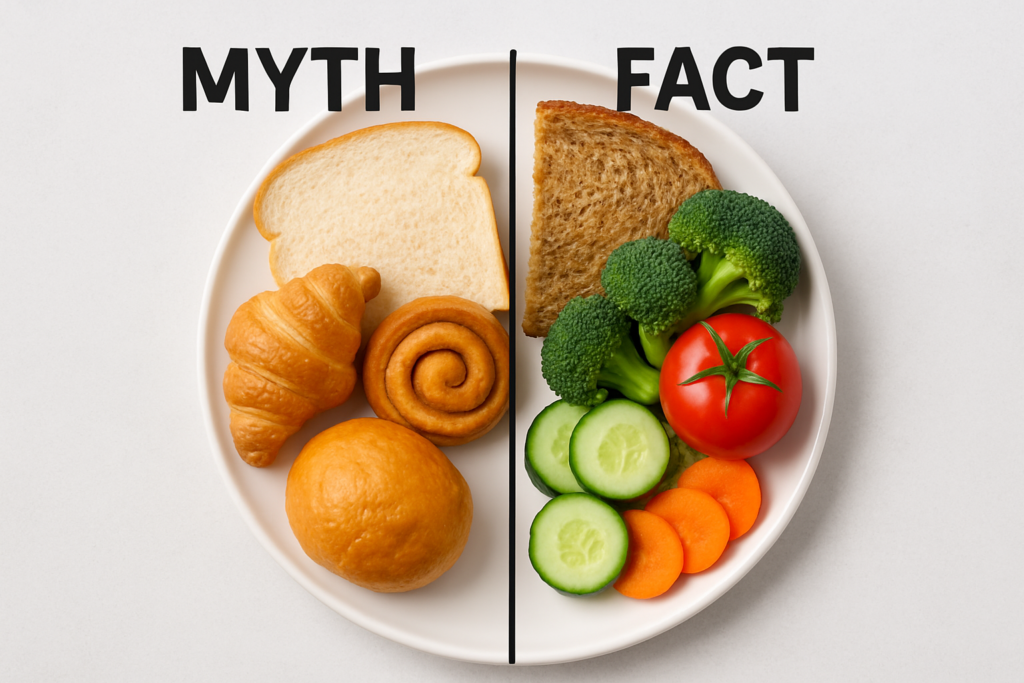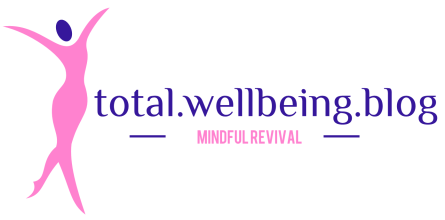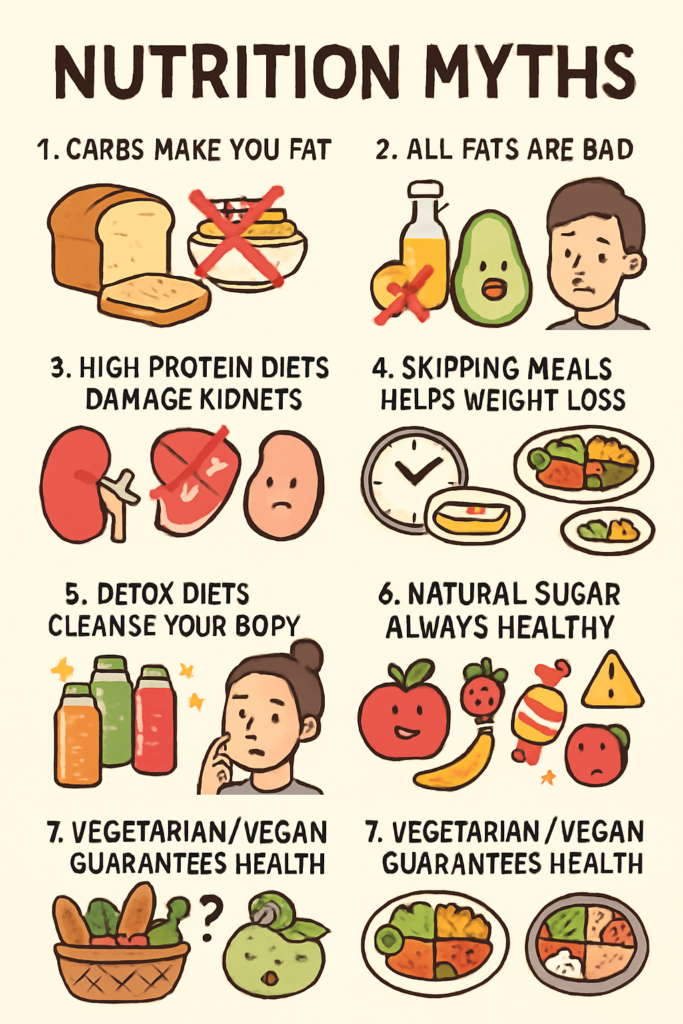Introduction
In today’s world of social media, fad diets, and viral health trends, misinformation about food and nutrition spreads faster than ever. That’s why nutrition myth-busting is so important. By debunking popular misconceptions, we can make informed choices that support long-term health and well-being.
In this article, we’ll cover 7 nutrition myths you’ve probably heard and explain the truth behind them. By the end, you’ll see how these myths could be sabotaging your health and how to eat smarter with confidence.
Myth 1: Carbs Are Always Bad for You
Carbohydrates are often blamed for weight gain and poor health. But here’s the truth: carbs are your body’s primary energy source. The problem isn’t carbs—it’s the type and quantity of carbs you eat.
- Example 1: Eating a plate of brown rice with dal and veggies will fuel your body with fiber and nutrients.
- Example 2: Eating 3 cream-filled pastries, however, will spike your blood sugar and likely be stored as fat.
Nutrition Myth-Busting Fact: Carbs from whole foods (fruits, oats, quinoa, vegetables) support energy, digestion, and even weight management. Refined carbs (sodas, candy, white bread) are the ones to limit. Research from the Harvard School of Public Health confirms that whole carbs like oats and quinoa support long-term health

Myth 2: All Fats Are Bad
For years, people avoided fat thinking it was harmful. But fat is essential—it helps absorb vitamins, supports brain function, and provides long-lasting energy.
- Example 1: Cooking with olive oil (healthy monounsaturated fat) supports heart health.
- Example 2: Eating too many fried pakoras daily (trans fat and deep frying) increases bad cholesterol.
Nutrition Myth-Busting Fact: Good fats (olive oil, nuts, seeds, avocados, fatty fish) are your friends. Trans fats and excessive fried foods are the real culprits. Instead of avoiding fats, choose healthy oils. If you’re confused about which oil to use, check out our detailed guide on the Best Cooking Oil in India
Myth 3: High-Protein Diets Damage Kidneys
Unless you already have kidney disease, protein won’t harm your kidneys. In fact, protein builds muscles, keeps you full, and boosts metabolism.
- Example 1: A gym-goer eating chicken breast, paneer, or lentils helps muscle recovery and doesn’t damage healthy kidneys.
- Example 2: Someone with existing kidney disease, however, should avoid excess protein under medical advice.
Nutrition Myth-Busting Fact: Protein-rich foods like dals, beans, lean meat, tofu, and eggs are safe and essential for most people.
Myth 4: Skipping Meals Helps with Weight Loss
Skipping meals may seem like an easy way to cut calories, but it often leads to overeating later.
- Example 1: If you skip breakfast, you may feel so hungry at lunch that you eat double the portion.
- Example 2: Structured intermittent fasting (like eating between 12 pm–8 pm) can help some people, but it’s not the same as randomly skipping meals.
Nutrition Myth-Busting Fact: Eating balanced, portion-controlled meals at regular times keeps energy steady and helps maintain a healthy metabolism.
Myth 5: Detox Diets Cleanse Your Body
Juice cleanses and detox teas promise to “flush out toxins,” but your body already has a detox system—your liver, kidneys, lungs, and skin.
- Example 1: A 3-day juice cleanse may make you lose 2–3 kg, but it’s mostly water weight. The moment you return to normal eating, the weight comes back.
- Example 2: Drinking enough water, eating vegetables, and sleeping well naturally support detox.
Nutrition Myth-Busting Fact: You don’t need pricey detox products. A balanced diet and hydration are the real “detox.”
Myth 6: Natural Sugar Is Always Healthy
It’s common to think that honey, jaggery, or coconut sugar are “healthier” than white sugar. While they may contain trace minerals, they’re still sugar and should be consumed in moderation.
- Example 1: A teaspoon of honey in green tea is fine, but adding 5–6 spoons daily to desserts adds up to the same as white sugar.
- Example 2: Eating a mango or apple provides natural sugar along with fiber and vitamins—much better than processed sweets.
Nutrition Myth-Busting Fact: Whole fruits are the healthiest sweet option. “Natural” sugars like honey should be used sparingly.
Myth 7: Going Vegetarian or Vegan Guarantees Health
Going plant-based can be healthy—but only if you eat whole, balanced foods. Many new vegetarians end up eating fried foods, chips, or processed plant-based burgers, which aren’t necessarily healthy.
- Example 1: A vegetarian who eats lentils, vegetables, nuts, and whole grains gets excellent nutrition.
- Example 2: A vegetarian who lives on fries, pizza, and sugary drinks may still struggle with weight and health issues.
Nutrition Myth-Busting Fact: Vegetarian and vegan diets can lower cholesterol and improve heart health if based on whole foods, not processed snacks.
Conclusion: The Power of Nutrition Myth-Busting
Nutrition myths spread quickly, but science paints a different story. Carbs aren’t the enemy, healthy fats are essential, protein is safe for most people, and your body doesn’t need an expensive detox.
By busting these myths, you can make smarter, evidence-based choices that support long-term health and wellness. Remember, the key is balance, moderation, and consistency—not extreme diets or quick fixes.
Before making major changes to your diet, always consult a healthcare professional or a registered dietitian. If you want to take your nutrition further, explore our blog on 7 Summer Drinks That Lower Cholesterol Naturally For more reliable global insights on healthy diets, check out the World Health Organization’s nutrition guide.”




Pingback: Top 5 Fitness Apps and Wearables to Transform Your Health in 2025
I was suggested this blog via my cousin. I am not positive whether or not this submit is written by means of him as nobody else recognize such distinct about my problem. You’re amazing! Thank you!
Thanks so much for your message!
Your article helped me a lot, is there any more related content? Thanks!
Thank you—glad the article was helpful and sparked interest in more!